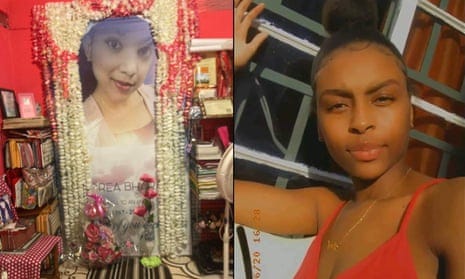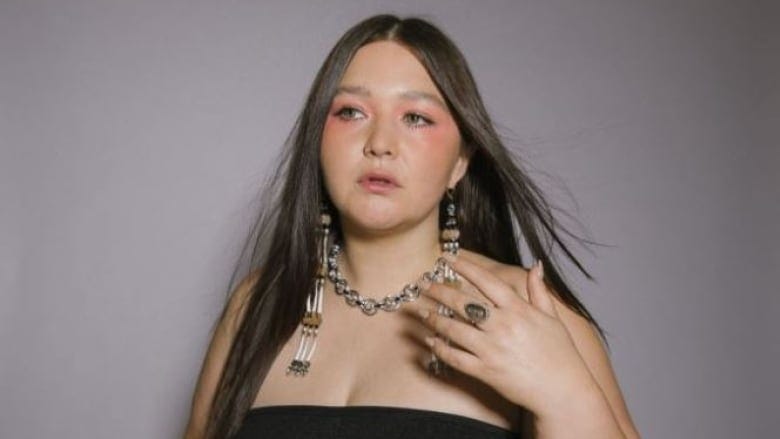Global Roundup: Malaysia LGBTQ+ Community, Trinidad and Tobago Femicide Crisis, Switzerland Feminist Strike, Queer, Latine & Disabled Writer, 2Spirit Indigiqueer Musician
Curated by FG Contributor Samiha Hossain
Musician Shaf, aka moreofthem, grew up experiencing a “lot of internalised homophobia” and gender dysphoria in Malaysia – a country where LGBTQ+ and trans identities are criminalised. (Ben Ashurst)
LGBTQ+ people in Malaysia are under sustained attack from the government, but the next generation is giving hope, says Shaf, the musician also known as moreofthem. Queer people have faced arrests and forced conversion therapy in what officials term an attempt to stem the “spread of LGBTQ+ culture in society”. Shaf grew up experiencing a “lot of internalised homophobia” and gender dysphoria.
Before moving to the UK for the first time a few years back, Shaf kind of knew the “idea of being transgender”, but there wasn’t a “lot on display back home”. The predominantly Muslim country criminalises consensual same-sex sexual intimacy, with punishments ranging from corporal punishment to imprisonment under Sharia Law and British colonial-era civil laws. The Malaysian government relies on the force of the law to prohibit expression and conduct that it deems outside of heterosexual, cisgender norms.
At the start of the year, Shaf visited Malaysia to see family and friends. They say that they have to be careful and raids can happen. However, they were pleased to see that there is a growing acceptance of queerness among younger generations.
I’ve seen a lot of people with trans identities, and I have a few friends that are non-binary in Malaysia, and they’re able to navigate Malaysia quite safely for the most part. But they do lack the resources in the sense there’s not a lot of LGBT-friendly clinics back in Malaysia. -Shaf
Being from Malaysia, Shaf wants to use their platform, music and identity to “help champion others and give them a voice”. After all, they know the power of visibility first-hand. They say their eyes were opened when a “really good friend” began transitioning and it gave them the strength to embrace their own identity as well.
Andrea Barratt (left) and Ashanti Riley whose murders brought a wave of media attention to femicides in Trinidad and Tobago in 2021. Photograph: Handout
As of last month, the murder toll across the twin island state of Trinidad and Tobago was on track to overtake last year’s all-time high. As rates rise, more women are being killed than at any point in history. For women, it is a “national crisis” , says Dr Gabrielle Hosein, a writer and lecturer at the Institute for Gender and Development Studies at the University of the West Indies.
The Caribbean has a significant feminist movement that is extremely vibrant, full of women who are articulate, analytical and progressive. We have been pushing for a national prevention strategy for violence against women for a long time. -Gabrielle Hosein
Hosein believes violence in homes is a key problem that eventually leads to femicide. One in five women in Trinidad and Tobago report non-partner sexual violence and one in 10 report sexual abuse as a child. The figures of child sexual abuse and incest are very high as well. She says any efforts by the state to intervene in domestic violence or child abuse are seen as a threat to the ideology of the traditional family by predominantly Christian and male-dominated groups.
According to a paper published in the International Feminist Journal of Politics in 2021 – the year the murders of two young women, Andrea Bharatt and Ashanti Riley, gripped public attention in Trinidad – too many young men in Trinidad are “breaking bad”. The researchers linked “a lineage of violent male figures in poor neighbourhoods who were already bad” to leading increasing numbers of young men into gangs “which has mediated the pattern of new violence – the homicide boom – in Trinidad”.
When women die the questions are: ‘Why did she stay with him?’ or ‘Why did she go out alone?’ The question is never about why men are violent, or why they are acting with impunity or why the state is not challenging that. Acceptance of male violence is the norm. -Gabrielle Hosein
In response to the deaths of Riley and Bharatt, Phillip Alexander, a social activist and founder of the Progressive Empowerment Party, started the Candlelight Movement. Together with lawyer and radio host Kandace Bharath-Nahous, herself a survivor of an abusive relationship, he collected more than 128,000 signatures – almost one-tenth of the population and the largest ever public petition in the country – calling for action to end violence against women. However, nothing has been done, says Alexander.
Bharath-Nahous says stories abound of rape victims being turned away by police – she describes one woman who had been abducted and raped who was dismissed by local officers as having had a fling; another who ran naked and bloody into a police station and was sent home to put clothes on. When questioned about femicide in April 2022, the prime minister, Keith Rowley, appeared to shrug off the issue with a dismissive: “We are a violent society.”
Claire Guy-Alleyne, the police superintendent in charge of Trinidad and Tobago’s special victim unit aims to tackle the problem. Though she acknowledges there is a long way to go, she says change is slowly happening.
We are seeing change. It may be small, but we have women coming forward to say, ‘I have been in this abusive relationship for 20 years and because of the way your officers spoke to me, I am going to be able to do something about it.’ -Claire Guy-Alleyne
Swiss women march to demand more equality and the end of violence against women during a demonstration, amid the coronavirus disease (COVID-19) outbreak, in Zurich, Switzerland June 14, 2020. REUTERS/Arnd WIegmann
We did it to symbolize our anger and our rage at waiting, waiting and waiting. The salary inequality continues, violence continues and... there are not at all enough measures to match the scale of what is happening. -Françoise Nyffeler
Despite its reported high quality of life, Switzerland lags other developed economies in terms of women's pay and workplace equality. Swiss women earn roughly a fifth less than men, better than 30 years ago when it was about a third less, but worse than in 2000, according to government data.
Demonstrators called for equal pay, an end to violence against women and the LGBT community, and greater recognition of their often-unpaid work to care for family members. At 3:24 p.m., the time when women would technically begin working for free given wage discrimination, protesters began shouting at Geneva's Pleinpalais square – a collective cry that lasted about a minute.
Many Swiss women hold an annual strike and protests on June 14, a day that marks the anniversary of a 1981 vote that enshrined the principle of equality in the constitution.
PHOTO: COURTESY OF SOFIA VIERA.
Sofia Viera writes on Refinery29 about their journey healing and finding community as queer, latine and disabled. Viera describes growing up with fibromyalgia and being invalidated by the adults around them. Now, at the age of 26, while writing this story, they were able to open up and change their perspective on themself.
I requested to join a queer chronic pain support group. I reached out to queer Latine disabled activists for this story. Speaking to them, I felt, for the first time in my life when it comes to my disability, that I wasn’t alone. I wasn’t the only Latine, lesbian, nonbinary Boricua with chronic pain. I now know this is the power of community. -Sofia Viera
Viera says that colonization and capitalism are ableist, racist and homophobic, and serve to convince us that we are alone, all the while guilting us into being hyperproductive.
Having a safe space to express your frustrations, your joy, and all the emotions in between with people that you truly believe care, is essential in healing. -Sofia Viera
Mark Travis Rivera, a disabled and queer speaker and founder of Marked Dance Project, says trying to be like everyone else nearly made him lose his life. He says his diagnosis with cerebral palsy, when he was a child, made his own queer acceptance easier. He was already different.
Once Viera was able to learn to believe that other people cared for them, everything changed, they say. They admit that finding your community is difficult, especially when you have intersecting identities. However, they have found the internet to be a great tool to build community.
The world at large may be horrible and depressing, but finding people that treat you with tenderness and compassion can change everything. I’ve found mine, and I’m sure there will be more in the future to add to my list of favorite people. But finally… finally, I can include myself there too. That’s what healing in community truly means. -Sofia Viera
Edzi'u says their music draws from different genres and eras, ranging from the traditional songs sung by their grandmothers to '80s pop and rock ballads. (Rachel Pick)
Musician Edzi'u creates soundscapes that explore colonialism and Indigenous resistance in Canada.
As a student at Vancouver Community College studying music theory and composition, Edzi'u says they suffered from a form of writer's block after coming out of what they describe as an abusive relationship. The Tahltan and Taku River Tlingit musician found inspiration in CDs their grandmother had given them that featured generations of their grandmother's stories and songs. They pulled clips from the CDs and created their first album Kime Ani.
Edzi'u, who in addition to being a musician also works as a sound tech at the broadcasting company CBC, later integrated sounds they collected from the world around them. That approach influenced their latest work, Potlatch in the Box, a concept album that uses the framework of the potlatch to discuss colonialism and Indigenous resistance.
So what my practice is, is I'll do interviews with people and I'll take clips from those interviews and use them in the songs that I create. I will record an interview with somebody and I'll listen to it and I'll just pull what feels right. I do a lot of my creating purely off of what I feel the ancestors in the room are telling me to do. -Edzi'u
One track on the album, 2Spirit, explores the federal ban on potlatches and two-spirit identity. A ban on the potlatch was legislated under an 1884 amendment to the 1876 Indian Act by the Canadian government, which came into effect in 1885. The legislation made it a criminal offence for anyone to participate in the potlatch, a gift-giving feast that was traditionally used to mark a variety of important milestones and occasions in West Coast tribes and customs, and as a way of celebrating life. Edzi'u says the song draws parallels between the potlatch ban and "the ways that we have really put away a lot of our knowledge and teachings around gender and sexuality within our culture."
I want people to hear the ways that our ancestors and our relatives had to be quiet behind a door. And then the banging of the RCMP on the door when people would practise their culture in secret during the potlatch ban because they were afraid to be arrested and afraid that their sacred beings would be stolen from them. -Edzi'u
Samiha Hossain (she/her) is a student at the University of Ottawa. She has experience working with survivors of sexual violence in her community, as well as conducting research on gender-based violence. A lot of her time is spent learning about and critically engaging with intersectional feminism, transformative justice and disability justice.
Samiha firmly believes in the power of connecting with people and listening to their stories to create solidarity and heal as a community. She refuses to let anyone thwart her imagination when it comes to envisioning a radically different future full of care webs, nurturance and collective liberation.








